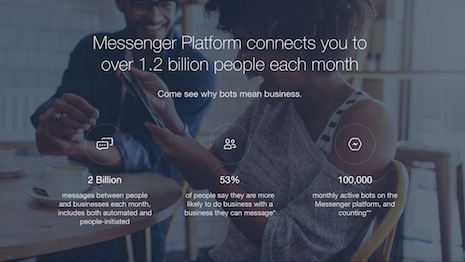- About
- Subscribe Now
- New York,
June 6, 2017

 Jason Kapler is vice president of marketing at LiveWorld
Jason Kapler is vice president of marketing at LiveWorld
By Jason Kapler
Direct messaging is on the rise. In only a few years, consumers have shifted from contacting companies via telephone and email to reaching out through messaging applications.
The desire to connect with a brand in a more personal way is driving them to ask questions and purchase items through direct-to-brand conversations.
Messaging apps are no longer an optional way to interact with customers. They have become the number one preferred consumer channel.
Billions served
Messaging apps have more than 4 billion monthly active users, with WhatsApp and Facebook Messenger being the most widely used, with each supporting 1 billion active users worldwide.
 Facebook's Messenger app has more than 1.2 billion users worldwide. Image credits: Facebook
Facebook's Messenger app has more than 1.2 billion users worldwide. Image credits: Facebook
Messaging apps are typically free, use less data, and host better features than texts and other communication channels.
Consumers are coming over to messaging apps in hoards.
Facebook Messenger users go on the app an average of 14 times a day, spending a total of 46 minutes on the app. The average daily retention rate is up to 60 percent.
Brands are taking notice.
According to the Business Insider publication:
“Chat apps boast a number of distinct characteristics that make their audiences particularly appealing to businesses and marketers, including their size, retention and usage rates, and user demographics.
“The combined user base of the top four chat apps is larger than the combined user base of the top four social networks.
“Chat apps also have a higher retention and usage rates than most mobile apps.
“Finally, the majority of their users are young, an extremely important demographic for brands, advertisers and publishers.”
Companies are increasingly focused on messaging apps to reach a younger population, building out services and monetizing the massive user base that chat apps boast.
While social media remains a promising frontier, more personal one-on-one conversations with consumers are too good to pass up.
Preparing for customer demand
Even as brands are recognizing the need to meet consumers where they are, they have not all taken the steps necessary to make it possible.
Companies must be ready to engage customers in real-time and learn how to transform the customer experience by integrating messaging apps into their marketing strategy. In doing so, they stand to unlock new levels of loyalty from a new generation of consumers.
If marketers have learned one thing in this always-on, tech-savvy culture, it is that consumers drive marketing, and not the other way around. “The customer is always right” still rings true.
Brands who want to be competitive, inspire loyalty and grow must stay in step with their consumer base instead of lagging behind to see what the competition does.
If consumers are asking for more direct dialogue with brands, those brands must deliver or be left behind.
Brands that effectively engage directly with customers on their preferred channels will leapfrog the competitive set that believes messaging apps are just a trend.
Those brands unwilling to invest in the architecture, technology and support for delivering an authentic customer experience will see their customers go elsewhere.
It is simply good business to be more conversation-centric and relationship-focused, which is the primary benefit of integrating messaging apps into the marketing mix.
One-on-one engagement a tap away
It is ironic that while our culture has morphed from relationships being more physical to more virtual, we are increasingly searching for more personal interactions.
We may have hundreds of virtual friends on Facebook, but what we really crave is one-on-one conversations. We want these personal interactions amongst each other as well as with the brands we support.
 WhatsApp is another Facebook messaging app that is highly popular worldwide. Image credits: WhatsApp
WhatsApp is another Facebook messaging app that is highly popular worldwide. Image credits: WhatsApp
Smart marketers recognize the urgency to adopt chat app technology into their marketing mix. Those who are not responsive in both messaging apps and social media run the risk of not only ignoring a massive audience, but actually creating a negative consumer experience.
Consumers have come to expect brands to offer more communication options beyond email and phone.
The companies who dig in their heels and resist this changing dynamic will find their competitors fill the void and lure their customers away.
Customers are flocking to the brands that are responsive to their demands – those who create remarkable experiences.
In this on-demand world to which we have all become accustomed, consumers expect their favorite brands will follow suit and provide personalized engagement opportunities.
Facebook Messenger now enables brands to drive more engagement and transactions through direct-to-brand conversations. This is where consumers are spending their time, with greater frequency and duration than mobile apps and with greater retention rates. There is no better channel for brands to be.
As Facebook adds more capabilities and features to Messenger every week, audience and usage rates will increase, further displacing Web sites, mobile apps and search engines.
We have seen this model prove itself with the WeChat messaging app in China.
WeChat is constantly introducing new features. The latest is the addition of “mini programs,” which are light apps built within WeChat that remove all of the inconveniences of native apps.
This is just one example of how the Chinese are a step ahead of the United States when it comes to understanding how to engage with consumers in the easiest way to gain followers and loyalists.
BRANDS MUST embrace this new communication channel and show consumers that they are ready to engage when and where consumers expect it.
This will become a competitive advantage for someone. Will it be you?
Jason Kapler is vice president of marketing at LiveWorld, New York. Reach him at jason.kapler@liveworld.com.
Share your thoughts. Click here